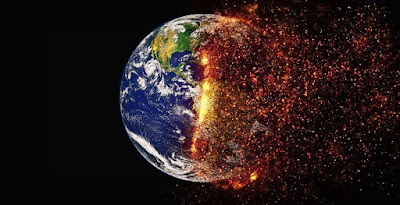Greenland rain, a warning for climate change
Record number on climate change
 |
| Climate change |
- Greenland, an area covered with ice two miles above sea level, is located in the center of Antarctica.
- The island witnessed during the recent period, rain fell on the highest point on the island for two days, instead of snow, this was only the fourth time that temperatures had risen there.
- The 337,000 square miles of the territory's ice sheet has been subjected to surface melt, in total, the summit has submerged 7 billion tons of water.
“Rain falling in one of Earth’s most reliably frozen regions is an unprecedented shock to the system,” says John Walsh, a professor at the University of Alaska Fairbanks and a scientist at the International Arctic Research Center. unknown".
- The Labrador and Greenland seas, which wrap around the island's east, south and west coasts, play pivotal roles in driving what Walsh calls the "global conveyor belt" of ocean currents.
- These seas are the world's main centers of deep convection, a process in which cooler and denser ocean waters sink and warmer waters rise to the surface.
- This turbulent action fuels the flow of the world's oceans, which in turn helps stabilize global temperatures and precipitation.
- But fresh water impedes deep convection, because it is less dense than salt water, it lies above the ocean surface like a cap. the whole world.
- In 2016, scientists found evidence that this asynchronous extreme weather was caused in large part by a significant slowing of ocean currents at the time, particularly those near present-day Greenland.
"The more Greenland melts, the more fresh water is on the top," Walsh says. "Now the evidence seems to suggest that we're already seeing a conveyor belt slowdown. The combination of recovery and warmth is a double whammy and a real concern."
- This feedback loop contributed to the rain on top of Greenland. The ocean was warmer and fresher than usual this summer, causing the air to move inland for rain instead of snow.
"The distinction between ice and snow is important in the Arctic," says John Moore, a geophysicist who specializes in glaciology and professor at the University of Lapland. "In locations like the inner summit of Greenland, where it hasn't rained before, 'ice' is technically a misnomer. really made of layers and layers of snow, which over time, under great weight, became densely packed, though still containing small pockets of air.”
- But now, meltwater and rain freeze into solid layers of ice that take several weeks, if not months, to dissolve naturally.
- Nobody lives near the top of Greenland, but in other parts of the Arctic, these freezing rain events wreak havoc on both natural and urban ecosystems.
- Thousands of reindeer, unable to dig in the freezing rain to reach the vegetation to eat, have starved in the past few years.
- Indigenous communities across the Arctic, who depend on reliable freeze-and-thaw seasons, and on animals that migrate according to the weather, find transport across ice sheets — rather than snow — a major challenge.
- The rain in Greenland occurred just five days after the Intergovernmental Panel on Climate Change (IPCC) released its climate report Code Red for Humanity, and it coincided with widespread wildfires across Greece and Turkey, and historic droughts in both South Africa and the American West, Record temperatures around the world. According to Moore, rains in Greenland and these events are interrelated.
"Like a pot of boiling water on the stove, you raise the temperature and create all kinds of chaotic cycles," Moore says. "What happened in Greenland is evidence of this chaos."
"The rain in Greenland happened something that scientists didn't even expect," Walsh says. “So what else is there? That is the real concern here. There might be some surprises that we don’t expect at all.”
Dear readers, we have put to you our opinion and our investigations about what is going on in the world about climate change, what is your opinion?

Comments
Post a Comment
Thank you for comment